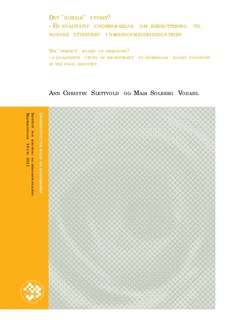| dc.description.abstract | Tema for vår masteroppgave er rekruttering til norske styreverv i næringsmiddelindustrien, i henholdsvis aksje- og allmennaksjeselskaper (AS og ASA). Tidligere forskning viser at rekruttering tradisjonelt foregår gjennom aksjonærenes, administrasjonens og valgkomitémedlemmenes egne profesjonelle nettverk. Formålet med oppgaven er å bidra til større innsikt i hvordan rekruttering til styreverv foregår i næringsmiddelindustrien. Med utgangspunkt i hvordan selskapene setter sammen sine styrer har vi undersøkt hvilke faktorer som påvirker styresammensetningen, og hvordan de innvirker på rekrutteringsprosessen. Vi har derfor undersøkt om det finnes forskjeller mellom aksje- og allmennaksjeselskaper, og samtidig sett på om kjønnsmangfold er av betydning i styrerekrutteringen.
Vår undersøkelse har en eksplorativ metodisk tilnærming, og bygger på semi-strukturerte dybdeintervjuer med femten informanter fra AS og ASA i næringsmiddelindustrien. Våre resultater viser at nye styremedlemmer til både AS og ASA hovedsakelig rekrutteres på basis av tillit, og gjennom profesjonelle og personlige nettverk. Videre ser vi at rekrutteringsprosessene ofte bærer preg av å være enkle og raske. Våre funn viser også at rekrutteringsbyråer og dataregistre over styremedlemmer benyttes i liten utstrekning. Analysen av resultatene viser at AS- og ASA-selskapers eierkonstellasjoner er av stor betydning for rekrutteringen til styret. Imidlertid kan eierkonstellasjonene resulterer i ulik balanse i styresammensetningen for AS og ASA. Videre ser vi at formelle lover og regler angir et skille mellom AS- og ASA-selskapers ulike rekrutteringsbehov. Resultatene av analysen viser at kjønnsmangfold er av ulik betydning i rekrutteringsprosessen som kan relateres til kvoteringsloven. Våre resultater viser imidlertid at nye medlemmer til både AS- og ASA-styrer først og fremst rekrutteres for å tilføre selskapet kritiske ressurser og nytteverdi. Videre ser vi at den etterspurte humankapitalen til styret varierer i henhold til AS- og ASA-selskapenes organisatoriske og kontekstuelle behov og utfordringer.
Samhørighet i styret og medlemmenes innsatsvilje og engasjement får innvirkning på hvem som rekrutteres til styreverv i både AS og ASA. Analysen av våre resultater viser derfor at et styre kan betraktes som et strategisk beslutningsteam.
The theme of this master`s thesis is recruitment to Norwegian board positions in the food industry, respectively to limited and public limited companies (Ltd. and PLC). Empirical evidence suggests that recruitment traditionally is done through informal networks of stakeholders, management, electoral committee or existing board members. The purpose of this study is to contribute to greater insights in how recruitments board positions is done in the Norwegian food industry. Based on how boards of directors are composed, we have explored the elements that may influence the company’s board composition. And, further how this may affect the recruitment process. We have therefore looked into possible differences between Ltd. and PLC companies. At the same time we have analysed recruitment from a diversity perspective to see if gender can affect the recruitment process.
Our study has an explorative approach, and is based on semi-structured in depth interviews with fifteen informants from various Ltd. and PLC companies in the food industry. Our research results show that recruitment of new board members to both Ltd. and PLC companies primarily is based on trust and done through professional and informal networks. We also found that supporting actors like head hunting companies, and databases of potential board candidates, are to a small extent used in the recruiting-process. The analysis of the results indicates that the constellation of ownership for both Ltd. and PLC companies, are largely influence the recruitment to board positions. Still, different constellations may result in differing balances in board composition for respectively Ltd. and PLC companies. Furthermore, we see that public laws and formal regulations state a distinction between Ltd. and PLC companies need for new recruitments to their board of directors. Our analysis shows that gender diversity has different affect on the recruitment process in relation with the Norwegian quota law. Nonetheless, the analysis implies that new board members primarily are recruited to supply critical resources and provide utility value to both Ltd. and PLC companies. We also see that the human capital in demand varies according to both the company’s organisational and contextual needs, and the challenges facing the company. Our findings also show that the board members interdependence, involvement and their drive to make an effort in the board room influence the director selection to board positions, to both Ltd. and PLC companies. Our analysis therefore implies that boards of directors can be understood as strategic decision-making groups. | no_NO |
